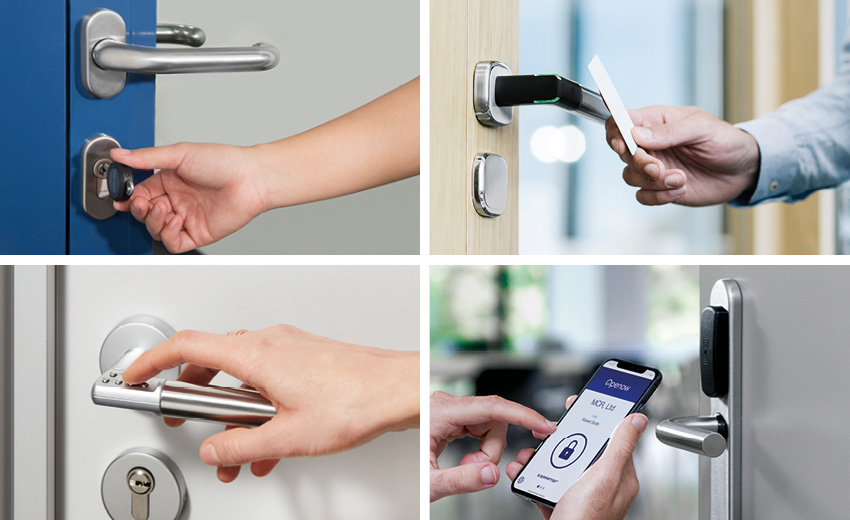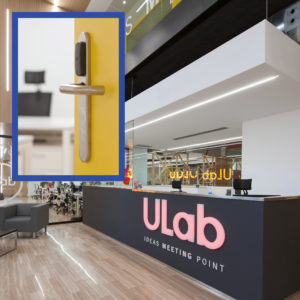Exclusive: Exploring the “single solution” myth in access control


James Thorpe
Share this content
ASSA ABLOY has a range of wireless access solutions which are ideal for every workplace.
Not every access control problem has the same solution. Does that seem obvious? Perhaps. But putting the right technology to work in your business will make a big difference to both workplace efficiency and the bottom line.
Of course, many benefits of wireless access control do apply to all use cases — whatever their size. Wireless devices offer greater flexibility without sacrificing security. They are easy to retrofit, increasing the level of control security managers can exert without major disruption to a building’s structure. And because they are powered by standard batteries, wireless locks help companies reduce both energy bills and carbon footprint.
However, scale and functionality — what your business really needs from an access system — will vary widely depending on the setting.
Filtering access for entry-level applications
You can add digital security to any sensitive interior door without complex access control. Code Handle, a secure handle with a built-in PIN keypad, runs autonomously without software or wiring. A secure PIN code ensures only authorised people unlock your door.
At the head office of digital marketing agency, Thirst, managers identified two doors which required an easy, low-cost security boost. Staff and visitors come and go all day, but not everyone should have access to the Thirst server room or private meeting suite. “We found Code Handle easy to install and a perfect solution for keeping private rooms only accessible for those employees that require access,” says Nigel Cattermull, Founder, Owner and Managing Director at Thirst.
When you switch mechanical lock-and-key technology for Code Handle, there are no more keys to carry or track. Users manage hassle-free: a four digit code on the handle’s inbuilt keypad opens the door on demand. Close the door and your Code Handle locks itself automatically. The auto-locking feature brings added peace of mind. Nobody at Thirst needs to worry whether they remembered to lock the server room: Code Handle never forgets.
Upgrading to digital access, even in a small business
Not every business needing more sophisticated functionality has a dedicated security management team. For these small and medium-sized operations, CLIQ Go is the ideal solution. With CLIQ Go, any non-specialist — a managing director or receptionist — can issue personalised access rights in programmable electronic keys. They can quickly cancel any that are lost or when employees leave. CLIQ Go’s companion software makes it easy. Likewise, installation: key-operated CLIQ locks are wireless, so there’s no drilling at the door or cabling.
Another easy upgrade to digital security, SMARTair wireless access control replaces mechanical keys with credentials stored on an RFID card, fob, wristband or smartphone. Lost or stolen keys no longer present a problem, because these secure electronic credentials can be cancelled or reissued in an instant. A choice of online (real-time) and offline system management options ensures you can pick a SMARTair system that is right for your workplace.
For new premises in Rennes, France, accommodation provider, Easy Student sought reliable, key-free locking. They wanted the student residence to run efficiently — “like a hotel” — and without the workload physical keys bring. Easy Student managers chose SMARTair Update on Card access control. Wireless Electronic Escutcheons with inbuilt RFID readers filter access through 83 doors at Easy Student Rennes. SMARTair Wall Readers secure non-standard entrances.
SMARTair’s intuitive software interface and time-saving functionality make it easy for administrators to manage their access system. “SMARTair does not require any technical knowledge. I trained quickly and found the software very easy,” says Cyril Verger, Managing Director at Easy Student Rennes. “The solution corresponds perfectly to our needs. Installation was simple.”
If someone loses a credential, cancelling it is fast and easy — a change from the old days of physical keys, mechanical locks and key organisation charts. “A lost key can still be used,” M. Verger adds. “A lost credential can be cancelled easily.”
Your next credential is already in your pocket
Lost credentials pose a serious threat to workplaces. Over 17% of respondents to one recent survey admitted to losing an RFID card in the previous 12 months. It’s harder to lose your smartphone and likely you will quickly spot it if it goes missing. Plus, if your phone is stolen, password, pattern and fingerprint ID security keep thieves out. Credentials stored securely on a smartphone make sense. Analysts, Informa Tech forecast a 100% CAGR in mobile credentials issued over five years. By 2023, 15% of all new credentials will be mobile, according to their data.
There’s no longer any need for facility managers to administer physical credentials with ASSA ABLOY’s Openow mobile access solution. It integrates seamlessly with the SMARTair portfolio of wireless locks. SMARTair Openow mobile access control enables security managers and site users to manage virtual “keys” inside a smartphone app. The device we carry everywhere — the smartphone — now replaces a separate RFID card with MIFARE, DESFire, iCLASS or another proximity technology.
The fast-growing coworking and flexible office space sector is already an enthusiastic adopter. At ULab, in Spain, savvy managers prioritise the convenience and user experience of their users. This drew them to Openow, which gives workspace residents the option to carry virtual keys on their smartphone. Phones replace plastic keycards, so there’s no need for a card activation terminal on reception.
In this sector, image matters — and premises which offer mobile credentials via Openow make an impression. It’s slick, efficient and millennial friendly. “I would definitely recommend the SMARTair system, because of its design and technology,” says ULab Director, Enrique Burgos Pérez.
Single-seat management for every lock
In more complex businesses, access control often fits within wider security, building management or smart building workflows. Smooth integration is critical. In a survey of senior professionals for the ASSA ABLOY “Wireless Access Control Report”, almost all respondents agreed access control integration across a building is important. Nine in ten noted its growing importance over the last five years.
Another ASSA ABLOY wireless lock technology, Aperio is built on an open platform specifically for system integration. At one installation, digital transformation specialists, H-Farm needed to streamline access management at a growing portfolio of sites in Italy. H-Farm experiences rapid user turnover: new businesses join regularly plus they organise up to 300 events every year which are open to external visitors.
H-Farm selected a combination of Aperio handles, security locks and escutcheons, each easy to retrofit, so day-to-day work would not be disrupted by installers. The open architecture underpinning Aperio devices enables easy online integration with their Axis system via PRYSM AppControl. Remote operation from a single, central software interface is seamless, which makes administering the system easy. “Aperio wireless access control hardware is solid, nice looking and perfectly fits our environment — solving our access problem,” says Alberto Aldrigo at H-Farm.
The challenge at Centre Hospitalier Métropole Savoie (CHMS) in Chambéry, France, was slightly different. Access control requires multiple checkpoints and access rights tailored to individual staff and contractors. Real-time control, enabling managers to respond proactively including by opening and closing doors remotely, was another essential.
To meet their security challenges, managers selected Aperio locking technology integrated online with an ARD access management system. Because Aperio locks are wireless, the hospital could introduce many more layers of security and secure doors without incurring excessive installation or operating costs, including for sensitive offices and drug stores. Now staff no longer carry key bunches or waste valuable time hunting down relevant keys. All their individual permissions are stored on a single, programmable RFID credential.
Alongside standard wired locking, the hospital chose Aperio wireless escutcheons, wireless handles with integrated RFID reader and wall readers. A network of over 225 Aperio communications hubs connects every Aperio lock wirelessly to their central system. All the hospital’s battery-powered Aperio devices integrate natively with the access system, so wired and wireless access points at CHMS are managed together, with real-time management logs, remote door opening and free time slot management. Secure 128-bit AES encryption protects communications between Aperio lock, hub and system.
“Having just a single badge — and not having to carry around heavy keys — has been a major advantage for us,” says Béatrice Dequidt, Health Executive at CHMS. “We have implemented internal HR management procedures, creating badges that are automatically integrated into ARD’s operating software,” adds Alain Gestin, CHMS’ IT Systems Architect.
Bluetooth powers a new generation of intelligent keys
For utilities and others with a mobile or remote workforce, CLIQ Connect eliminates the need for workers to return to headquarters to collect, amend or return a credential. With CLIQ Connect, everyone carries their own programmable Bluetooth CLIQ key and keeps its access rights up to date on the move with just a smartphone — meaning fewer miles driven and less money wasted on unnecessary fuel. Data transmission via Bluetooth is up to 30% more efficient than Wi-Fi for the transfer process. CLIQ Connect offers a shortcut to becoming more sustainable without sacrificing security.
Administrators can set a PIN which keyholders must enter to update their key. A couple of clicks in the user-friendly CLIQ Web Manager interface is all it takes for security managers to protect new key rights with a unique PIN. Without entering the PIN, users will not be able to revalidate or update their key to open a new lock. This new function further boosts security against unauthorised access to sensitive areas like infrastructure sites, data stores and drug storage rooms.
With CLIQ Connect keys, mobile working becomes efficient, agile and secure. Bluetooth functionality makes rights updating slicker than traditional solutions like wall or portable updaters. Using smartphones as portable updaters also saves money: no more buying, maintaining or replacing dedicated updating devices.
At France’s ZeFil fibre optic network, in Toulouse, physical key management had become a hassle, threatening service quality. CLIQ wireless cylinders fit each of ZeFil’s multiple door types, without the need to run power cables. ZeFil keyholders chose between classic updating of key access rights at a fixed programming device and CLIQ Connect keys updated via smartphone. All they need is a smartphone and the CLIQ Connect app. Everyone saves valuable time.
Which is the right security solution for your business? Learn more about access control from ASSA ABLOY and download free solution guides.
Code Handle: https://campaigns.assaabloyopeningsolutions.eu/codehandle
CLIQ Go: https://campaigns.assaabloyopeningsolutions.eu/cliq-go
SMARTair Openow: https://campaigns.assaabloyopeningsolutions.eu/smartair-openow
Aperio: https://campaigns.assaabloyopeningsolutions.eu/aperio
CLIQ Connect: https://campaigns.assaabloyopeningsolutions.eu/cliq-sustainability
This article was published in the April 2020 edition of International Security Journal. To pick up your FREE digital copy, click the link here





